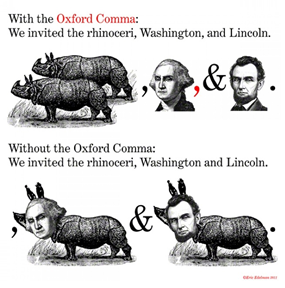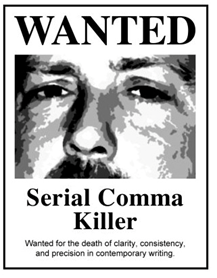
What is all the fuss about the Oxford comma? Such a small piece of punctuation has produced big debates in the world of writing – but why? Indie-pop band Vampire Weekend, in their song, Oxford Comma, proclaim to the world that this tiny tick of a mark doesn’t matter. They feel so strongly about it that these are the opening lines:
“Who gives a f#*% about an Oxford comma?
I've seen those English dramas too…”
But others would argue that the Oxford comma could have major influence on your business.
Is punctuation the sexiest part of your business copy? No, but the style of comma you use can make or break a potential client’s interest, and capturing new clients is sexy. The devil’s in the details, right? So, let’s find out how the Oxford comma can be an essential piece of kit in your business copy toolbelt.
What the Heck is an Oxford Comma?
The Oxford comma is used before the word and or or in a list of three or more items. It is called the “Oxford” comma because it was originally used at Oxford University Press, but many other publishers and printing houses now use this style. It is also known as the serial comma because it is used in a series of items.
Although the use of the Oxford comma originated in the U.K., its use is more commonly associated with American English. There are multiple reasons why this is so, among them is the publication of Strunk and Whites ‘The Elements of Style’. This little book proved to be highly influential and the authors were firm fans of the Oxford Comma.
As American English grows in influence and American spellings become more commonplace, we may find ourselves swapping out ‘s’ for ‘z’, dropping ‘u’, and making much more use of the Oxford in the future.
Here is an example of a sentence with and without the Oxford comma:
When the Oxford comma is not used, the sentence can read that Washington and Lincoln are beasts of men. Though this may be the figurative opinion of some, the use of the Oxford comma eliminates ambiguity. Think of it like a space-holder – it keeps what you intend to be separate, separate.
To Oxford Comma, or not to Oxford Comma?
Technically not using the Oxford comma is grammatically correct, so long as your choice to exclude it is consistent throughout your copy. But there are some solid reasons why using the comma can prevent confusion and add to clarity for your customers.
An Oxford comma can be worth more than its light weight in gold. A dairy company felt its impact in their recent lawsuit that lost them five million dollars in a dispute with their drivers about overtime pay. The drivers’ tasks included:
The canning, processing, preserving, freezing, drying, marketing, storing, packing for shipment or distribution of:
(1) Agricultural produce;
(2) Meat and fish products; and
(3) Perishable foods.
Due to a lack of a comma between “packing for shipment” and “or distribution”, the law referred to “packing” and “distribution” as two separate activities. The drivers were therefore eligible for overtime pay because they distribute, but do not pack, the goods. The lack of clarity in punctuation cost the company five million dollars.
Give the People What They Want
Our attention spans for advertising last a whopping average of 3 seconds! If a potential client must stop to figure out what you’re telling them, you may have lost them before the end of the sentence.
Every word and punctuation mark should be intentional and clear. The more clarity there is in your copy, the less your potential clients must figure out what you’re selling them. Clients don’t want to figure what you have to offer them, they want to trust what you’re saying from the get-go.
The Oxford comma can be used to avoid ambiguity. You don’t want your customer to have to think too much, but to be sold instinctually. Give them the information they need to make a purchase without wasting their time by playing guessing games.
You can use the Oxford comma to make a potential client’s options clear. Let’s say your company offers a variety of separate industrial cleaning services. Your options for clients are:
“…waste removal, window washing and floor maintenance.”
This sentence can suggest to the reader that window washing and floor maintenance are a package deal. There is a good chance they could either read the sentence incorrectly or be confused and possibly put-off by an unclear advert. With the Oxford comma, the offered services a client can choose are clear:
“…waste removal, window washing, and floor maintenance.”
Don’t be a Serial Comma Killer!
The debate over the Oxford comma can seem silly to some, but the use of it can mean a lot to your business. The lack of the Oxford comma could mean the loss of customers.
So, don’t be a serial comma killer! Make use of the Oxford comma by making your business copy effortless to read, engaging, and free from confusion.

 RSS Feed
RSS Feed